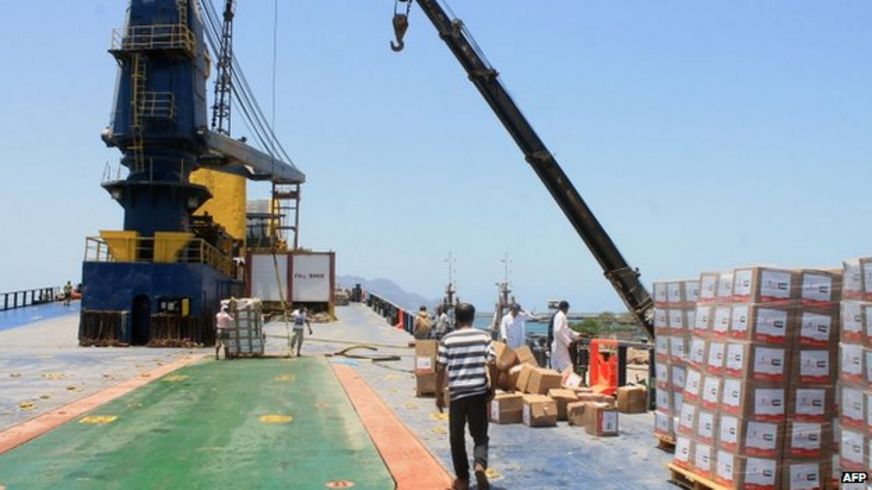Truce Ends, Airstrikes Resume in Yemen
By Brittani Howell
Impunity Watch Reporter, Middle East
SANA’A, Yemen—The five-day ceasefire ended late Sunday night. The Saudi-led coalition resumed airstrikes over Yemen blaming the Houthi rebels for breaking the truce. Yemen’s foreign minister, Riad Yassin, stated, “That’s what we said before – that if they start again, we will start again.”

The United States, a supporter of the Saudi-led coalition, also blamed the end of the truce on the Houthi rebels. State Department representative Jeff Rathke commented on Saudi Arabia’s “exercised restraint during the humanitarian pause” while the Houthis “moved missile-launchers to the border and shelled Saudi territory numerous times.”
Air strikes resumed late Sunday night and continued into Monday. Witnesses reported strikes attacking cities neighboring Aden.
The Saudi-led coalition does not intend to reinstate a cease-fire. However, air and sea ports used for aid relief will not be targeted. Saudi Arabian officials expressed remorse for the end of the cease-fire, blaming the Houthis for its end.
The UN and humanitarian groups urged for an additional five-day truce in order to extend aid to others. During the cease fire the United Nations was able to provide enough food for one month to 273,000 people. Fuel was provided to 1.2 million people to access water. Non-essential items were distributed to 32,000 people.
Yemen is a country of 26 million people and one of the poorest in the Middle East. An extended truce would have allowed supplies to reach others who remain in desperate need as a result of the air and sea blockade. Yemen relies heavily on imports in order to sustain its population.
Unicef was able to resupply medical centers and establish mobile centers to rural areas. Solar-powered refrigerators were also provided in order to keep vaccines cool. A Unicef representative, when commenting on the aid effort, stated, “humanitarian assistance cannot replace the needs of 26 million people who have been cut off from a regular supply of commercial imports of food and fuel.”
Even with the aid received, hospitals are still in great need of fuel in order to continue to operate the generators.
The Saudi-led coalition continues to attempt to re-instate President Abdrabbuh Mansour Hadi. President Hadi was exiled in late March. The efforts so far have not proven successful. The Houthis continue to advance in Aden with no sign of stopping. There is evidence that the truce allowed the Houthis to bring more troops into Aden.
According to the United Nations, since March 1,820 have been killed, 7,330 have been injured, and 545,719 have been displaced.
For further information, please see:
BBC- Yemen Conflict: Saudi-led Air Strikes Resume as Truce Ends– 18 May 2015
Chicago Tribune- Saudi-led Airstrikes in Yemen Resume After Truce Expires– 18 May 2015
Reuters- Saudi-led Air Strikes hit Yemen After Truce Expires– 18 May 2015
New York Times- Saudi-led Airstrikes Resume in Yemen as Truce Ends– 17 May 2015
Ireland Could be First to Legalize Gay Marriage by Referendum
by Shelby Vcelka
Impunity Watch Desk Reporter, Europe
DUBLIN, Ireland–
Voters in the Republic of Ireland are set to partake in a national referendum on 22 May to legalize gay marriage. The measure Ireland will ask its citizens to vote on is whether “marriage may be contracted in accordance with law by two persons without distinction as to their sex.” If the measure passes, it will be the first time gay marriage has been legalized through a national vote, rather than through the legislature or the court system.

The referendum marks a profound change in Irish politics, as the power of the Catholic Church has collapsed in recent years. Although 85 percent of the population still identifies as Catholic, priests no longer have unchallenged authority on political issues. Ireland, a historically socially conservative country, has been “one of the toughest places in the western world to be gay” because of its religious roots. As recently as 1993, homosexuality was criminalized, and was only legalized because of pressure from European authorities.
The changing political atmosphere and growing separation of Church and State has placed religious leaders against political leaders. Though the Catholic Church has not been incredibly active in the gay marriage referendum, they have encouraged Catholics to vote No.
In statements read out during Sunday Masses, the Catholic Bishops challenge claims from Yes activists that the measure would not substantially affect anyone besides members of the LGBT community. The Bishops argue that, while they do not want to alienate or belittle anyone, a Yes vote would abolish the traditional institution of marriage that is fundamental to the sustaining of human life and of a functioning society.
Conversely, the Yes activists argue that Ireland is ready to legalize gay marriage, as the younger generations are more tolerant and accepting.
Besides the Catholic Church, there are very few Irish establishment organizations that oppose same sex marriage. The government, major political parties, media organizations, unions and business groups all support a Yes vote.
Currently, polls show Irish voters favor a Yes vote by 58%, with 25% voting No, and 17% undecided. Although the polls appear solidly Yes, turnout could be an issue for same sex marriage legalization. In 1995, with the referendum to legalize divorce, a Yes vote passed 51% to 49%. Previous to that referendum, the vote showed most citizens favored legalization of divorce. Voter apathy and lack of turnout ended up making the vote that close.
If Ireland votes Yes, it will be the 18th country to legalize gay marriage. 13 of those countries are in Europe, with Slovenia being the most recent in March 2015.
For more information, please see–
BBC- Ireland’s divisive referendum on same-sex marriage— 01 May 2015
Independent–Alan Shatter: The majority of people will support the equality marriage proposal— 06 May 2015
Washington Post– Ireland could be first nation to legalize same-sex marriage by popular vote— 16 May 2015
Al Jazeera– Ireland appears set to say ‘yes’ in gay marriage vote— 17 May 2015
BBC– Same-sex marriage: Catholic bishops pen letters ahead of referendum— 17 May 2015
The Guardian–The same-sex marriage referendum has transformed Ireland before it’s even begun— 17 May 2015
VDC: The Weekly Statistical Report
Guyana Elects New Regime After 23 Years
By Kaitlyn Degnan
Impunity Watch Reporter, South America
GEORGETOWN, Guyana – David Granger of the Partnership for National Unity-Alliance for Change Coalition (APNU-AFC) has been sworn in as the eighth president of Guyana since 1966. Over 408,000 people participated in the election.

The elections were called after former Guyanese president Donald Ramotar suspended parliament back in November 2014. Ramotar was trying to avoid a vote of no-confidence after his party was accused of corruption.
Ramotar’s People’s Progressive Party (PPP) has been in power since 1992. The election that year was considered to be the first “free and fair” election since the country gained its independence.
Granger’s coalition will have a one seat majority over the PPP in the Guyanese Parliament of 65 seats.
The PPP has asked for a recount of votes in certain areas of the country, claiming that some votes were “suspiciously” rejected. The APNU says that recounts are illegal after a 12 hour period following the posting of results, as per the country’s 1964 Representation of the People Act.
The election was overseen by a number of international election observation groups, including a mission from the Carter Center. Former US president Jimmy Carter travelled to Guyana with the mission to oversee the election, but had to cut his trip short due to illness. He has issued congratulations to Granger.
Officials from the US and the UK, including the U.S. Embassy in Guyana have called the election “free and fair.” The Commonwealth Observer Group did express concern regarding the amount of time between the election and the results announcement, and said that it would issue a recommendation for a shorter waiting period.
In his address at his swearing in, Granger announced that there would be a “transition team” put together to facilitate the change in regime.
The APNU-AFC is a multi-racial bloc – representative of Guyana’s ethnically divided demographics. In the past, party allegiances have been strongly based on racial identity.
Guyana gained its independence from Great Britain in 1966. The region was settled by former slaves following the abolition of slavery, and indentured servants from India. English is the official language of Guyana. Although race has been a major source of division in past politics, Granger and the APNU-AFC have pledged to end racial divisions.
For more information please see:
Reuters – Guyana in political crisis after suspension of parliament – 17 Nov 2014
CIA World Factbook – Guyana – 13 May 2015
Business Standard – Guyana postpones release of official election results – 14 May 2015
The New York Times – Guyana Swears in New President Who Ended Foes’ 23-Year Rule – 16 May 2015
Reuters – Guyana swears in new president after multi-racial bloc wins vote – 16 May 2015
Stabroek News – Address by David Granger on swearing in as President – 16 May 2015
Stabroek News – Jimmy Carter congratulates Granger – 16 May 2015